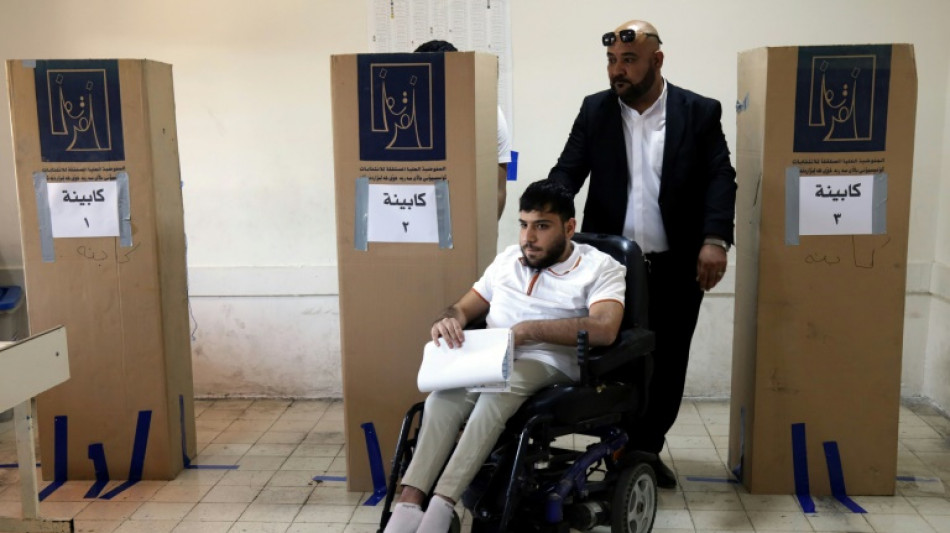
-
 Starbucks shift on non-paying visitors stirs debate in US
Starbucks shift on non-paying visitors stirs debate in US
-
US, Japanese lunar landers set to launch on single rocket
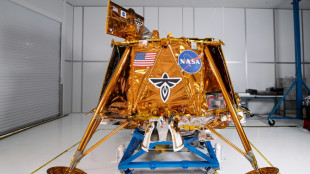
-
 Boeing 2024 plane deliveries tumble on labor, safety woes
Boeing 2024 plane deliveries tumble on labor, safety woes
-
Argentine annual inflation nosedives, in boost for Milei

-
 Meta to lay off 3,600 employees in performance-based cuts
Meta to lay off 3,600 employees in performance-based cuts
-
Mexico hails $5 bn Amazon investment in face of Trump threats

-
 MSNBC boss leaves ahead of Trump White House return
MSNBC boss leaves ahead of Trump White House return
-
Panama Canal will 'remain' Panamanian: UN maritime chief

-
 Amazon orders 200 Mercedes-Benz electric trucks
Amazon orders 200 Mercedes-Benz electric trucks
-
Amazon to invest over $5 bn in Mexico data center

-
 Lindt chocolate to raise prices again this year
Lindt chocolate to raise prices again this year
-
UK finance minister, hit by market woes, stands firm on growth

-
 Dozens rescued, 15 bodies pulled from South Africa mine
Dozens rescued, 15 bodies pulled from South Africa mine
-
Ukraine hits Russian army factories, energy hubs in 'massive' barrage

-
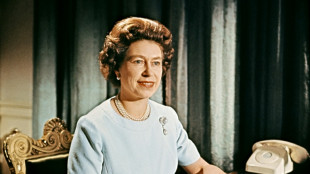 Queen was not told aide was Soviet spy for years, UK records show
Queen was not told aide was Soviet spy for years, UK records show
-
Global road transport emissions to peak in 2025: study

-
 NATO launches Baltic Sea patrols after suspected cable sabotage
NATO launches Baltic Sea patrols after suspected cable sabotage
-
'Persepolis' author refuses French award over Iran 'hypocrisy'
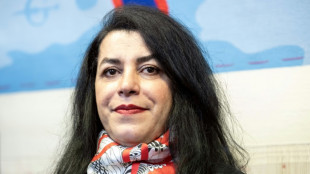
-
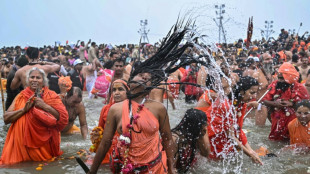 India's Hindu pilgrims: a sea of humanity at Kumbh Mela
India's Hindu pilgrims: a sea of humanity at Kumbh Mela
-
Blue Origin scrubs key test launch again, eyes Thursday
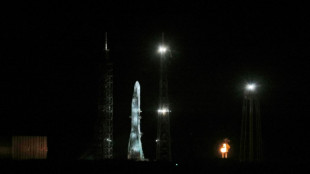
-
 North Korea fires short-range ballistic missiles into sea
North Korea fires short-range ballistic missiles into sea
-
'Not for the poor': Indonesians in capital face housing, commute woes

-
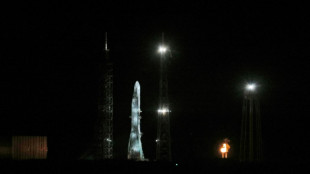 Blue Origin eyes early Tuesday launch but weather an issue
Blue Origin eyes early Tuesday launch but weather an issue
-
Trump's return threatens resurgence of trade wars

-
 Middle East-Based Sigma Capital Unveils $100M Fund to Accelerate Web3 Innovations
Middle East-Based Sigma Capital Unveils $100M Fund to Accelerate Web3 Innovations
-
Grammys still set for February 2, will support LA fire relief

-
 Kazakhstan says part of Aral Sea has nearly doubled in volume
Kazakhstan says part of Aral Sea has nearly doubled in volume
-
US announces new restrictions on AI chip exports

-
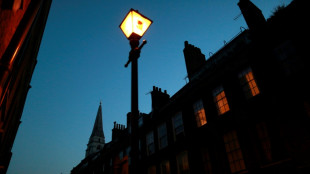 Relative of Jack the Ripper victim demands new inquest
Relative of Jack the Ripper victim demands new inquest
-
PM vows 'pro-growth' rules to make Britain an 'AI superpower'
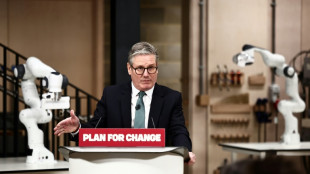
-
 Last tourist information centre in Paris closes
Last tourist information centre in Paris closes
-
Oliviero Toscani, photographer famed for Benetton ads, dies aged 82

-
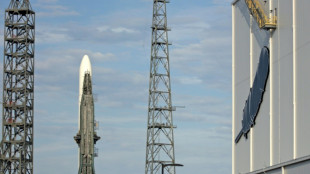 Blue Origin pushes back first launch of giant New Glenn rocket
Blue Origin pushes back first launch of giant New Glenn rocket
-
Markets track Wall St losses after blockbuster US jobs report

-
 Billion-pound lawsuit against Apple over App Store opens in UK
Billion-pound lawsuit against Apple over App Store opens in UK
-
Cyclone-battered region sees storm Dikeledi leave Mayotte for Mozambique

-
 Japan PM tells Biden 'strong' concerns over steel deal
Japan PM tells Biden 'strong' concerns over steel deal
-
China saw booming exports in 2024 as Trump tariffs loom

-
 Asian markets track Wall St losses after blockbuster US jobs report
Asian markets track Wall St losses after blockbuster US jobs report
-
Fueling the Los Angeles fires: the Santa Ana winds

-
 'Fragile' Mayotte still on high alert as storm moves away
'Fragile' Mayotte still on high alert as storm moves away
-
Storm moves away from Mayotte, three dead in Madagascar

-
 Toll from French tram crash rises to 68 injured
Toll from French tram crash rises to 68 injured
-
Apple wants to keep diversity programs disavowed by other US firms

-
 Cyclone-ravaged Mayotte on high alert as new storm approaches
Cyclone-ravaged Mayotte on high alert as new storm approaches
-
Cyclone-ravaged Mayotte on red alert for new storm

-
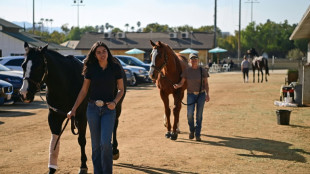 Scramble to shelter animals from Los Angeles wildfires
Scramble to shelter animals from Los Angeles wildfires
-
China's women e-sports players defy sexism for love of the game

-
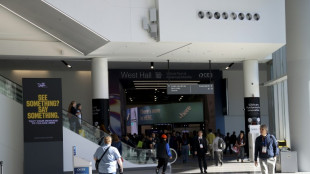 Tech sector's energy transition draws attention at Vegas show
Tech sector's energy transition draws attention at Vegas show
-
Five things to know about New Glenn, Blue Origin's new rocket
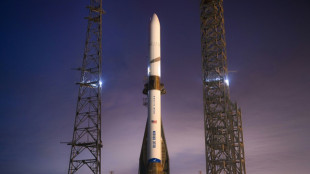

Oil-rich Iraqi Kurdistan votes, shadowed by economic struggles
Iraq's autonomous Kurdistan region voted on Sunday to elect a new parliament for the oil-rich region, where voters express concern over economic struggles and disenchantment with the political elite.
Iraqi Kurdistan presents itself as a relative oasis of stability in the turbulent Middle East, attracting foreign investors due to its close ties with the United States and Europe.
However, activists and opposition figures contend that the region, autonomous since 1991, faces the same issues affecting Iraq as a whole: corruption, political repression and cronyism among those in power.
Originally scheduled for two years ago, the vote has been postponed four times due to disputes between the region's two historic parties, the Kurdistan Democratic Party (KDP) and the Patriotic Union of Kurdistan (PUK).
Each party is controlled by a powerful Kurdish family -- the KDP by the Barzanis and the PUK by the Talabanis.
Despite holding election rallies and mobilising their patronage networks, experts say there is widespread public disillusionment with the parties, exacerbated by the region's bleak economic conditions.
By early afternoon, turnout was 31 percent, the electoral commission said, with polls due to close at 6:00 PM (1500 GMT) and official results expected 24 hours later.
Huri Mohammed, a 66-year-old housewife, said she voted for the KDP which dominates the regional capital Arbil, as it "serves the people".
But she expressed hope the next government would "pay attention to the poor classes. The majority of our population has limited means".
Opposition parties such as New Generation and a movement led by Lahur Sheikh Jangi, a dissident from the Talabani clan, may gain from a protest vote, said Sarteep Jawhar, a PUK dissident and political commentator.
Hiwa Hadi, a candidate for the newly formed opposition Halwest party, said after voting in Arbil: "People are dissatisfied and angry due to rising prices and taxes, electricity and water shortages".
- Tensions with Baghdad -
Political analyst Shivan Fazil, a PhD student at the US-based Boston University with a focus on Iraq, noted that there was "a growing fatigue with the region's two ruling parties".
He said people's living conditions "have deteriorated over the last decade."
Fazil cited erratic payment of salaries for the region's 1.2 million civil servants as problematic because the money serves as "a vital source of income for households".
This issue is tied to ongoing tensions between Kurdistan and the federal Iraqi government in Baghdad, amid disputes over control of the region's lucrative oil exports.
The creation of four new constituencies for this election -- a change from only one previously -- "could lead to redistribution in vote shares and seats in the next parliament", Fazil said.
He still predicted, however, that the KDP could maintain its majority.
The KDP is the largest party in the outgoing parliament, with 45 seats against 21 for the PUK. The KDP's majority was assured by an alliance with deputies elected via a quota reserved for Turkmen, Armenian and Christian minorities.
Iraqi court rulings have reduced the number of seats in the Kurdish parliament from 111 to 100, but with five seats still reserved for the minorities.
Of the region's six million inhabitants, 2.9 million are eligible to vote for the 100 representatives, including 30 women mandated by a quota.
In the last regional elections in 2018, voter turnout was 59 percent.
Once elected, the new representatives will need to vote for a new president and prime minister. The roles are currently filled by KDP figures Nechirvan Barzani and his cousin, Masrour Barzani.
Mohamed al-Hassan, the United Nations special representative in Iraq, welcomed the election as an opportunity for the Kurdistan region to "reinvigorate democracy and inject new ideas into its institutions".
However, 55-year-old teacher Sazan Saduala says she was boycotting the election.
"This government cannot be changed by voting," she said. "It maintains its power through force and money."
M.P.Jacobs--CPN
